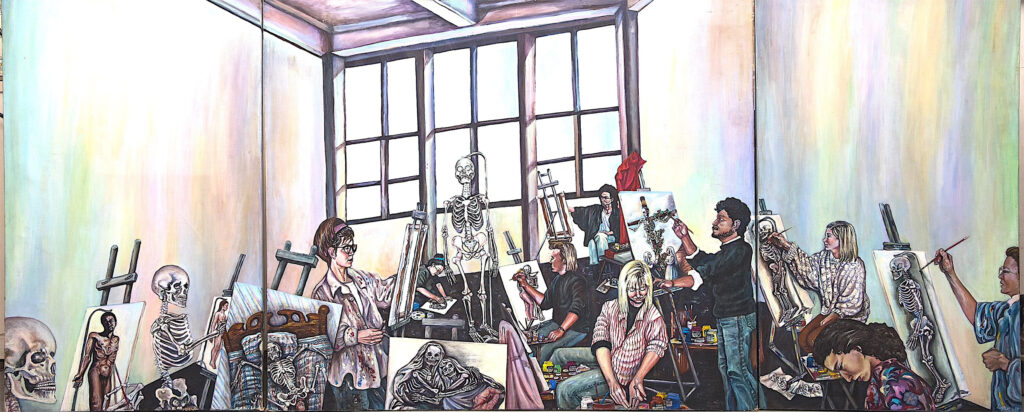In Memoriam, J.W.
It’s 1:30 a.m. or so, and a little while ago
I ate a banana.
I got up from the kitchen table
and dropped the peeling into the trash can
then ate an orange that I peeled
all in a long continuous strip
and dropped that in the trash too.
The orange, like all oranges,
was tart and burned my dry winter lips
a little when I ate it.
Whenever I peel an orange that way
I think of this guy I used to know
at my job who was a nice guy
but on the opposite end of the spectrum
from me politically.
He used to peel his oranges
then hang the skin
on the wall of his cubicle.
I never asked him about it
but guessed he did that
because there was always
only one fresh orange peel spiral
hanging from his cubicle wall.
He was a guy who believed in a literal
interpretation of the Bible
however it was that his preacher
happened to literally interpret it
so he’d get visibly angry sometimes
when we talked and I would say stuff
that I knew would piss him off
just to see him get all flustered
see his eyes narrow a bit
shoulders hunch or sometimes
he would draw back
look down his nose at me
like he was examining
a dangerous species of insect
before he found some way
to crush it.
Even though he was weird that way
I always kind of liked him
maybe because he was an old farm kid
from far out in the central part of Nebraska
and I was an old farm kid from even farther out
in western Nebraska, only I maybe
fell in with a crazy crowd and smoked dope
and dropped acid in the navy
while he walked the straight and narrow
in the army and held on
to all those home-grown values.
He was a master with the copy machine—
I, the kind of person who makes them jam up
just walking by—
so one day I asked him how he knew so much
about copy machines.
He kind of swelled up with pride
said he’d been some kind of printing technician
in the army.
But there at our job he had a hard time
adjusting to changes
and our job was always changing
thanks to cuts in funding
and a general overall attitude
of contempt for the poor
our right-wing governor had
in the red-necked state
we lived in and worked for.
I was the guy’s boss so I knew
the tough time he had adjusting
and I knew how he bucked the system
his own way by trying
to continue using all the old ways
because they were better.
One time before he got sick he told me
he was having trouble with his son
he was worried about him
who kept getting towed at his apartment
because he wouldn’t buy a sticker
or something goofy like that.
I felt queasy he would confide in me
about anything, especially his son
though it seemed like he was just making
dumb mistakes, nothing major like meth
or addictions to something else
like my kid that I’d never
shared with him, and never would have.
I thought his kid was being stupid
but didn’t say that and listened
father-to-father as though
he was telling me something truly shocking.
I told him tell your kid
buy the freaking permit
and he had, but there was some
excuse. That’s the closest we ever got
but I never could figure out
why he talked to me about it.
It was a closeness that I’d never felt
we either one had earned.
He was diabetic and overweight
but always ate carefully, low-carb,
took a walk in the lunch hour
to keep his weight down.
Explained to me how diabetics
can’t burn up carbs like normal.
He always said “Be careful”
as a way to send you off
at the end of the day
when most people would say
“See you tomorrow” or “Be good.”
One angry client took it wrong
one time and I had to defuse him—
“What did he mean by that—‘Be careful’—
was that a threat?”
The last time I saw him, he was heading out
for the weekend, had on a pair
of shooter’s goggles,
made me think somehow
of James Dickey, though I never told him
because I would have had to explain.
I talked to his wife on the phone
because she called in to say
he’d be out for tests
or for another two weeks
or that he’d be back
or they’ve got to do more surgery
or that he wasn’t coming back.
He’s the last guy I thought
would die out of all the people
I’ve worked with
who smoked cigarettes,
drank sodas, ate junk
and never exercised.
On a routine visit
it was the dentist
who spotted
the lesion.
I think of him every time I peel an orange
whether I can get that one continuous strip going or not.
No matter if I’m at home or work,
peeling an orange for breakfast
or like tonight, alone in the kitchen
waiting out stuff, I think of him
and wonder which one of us
was right, or if there is such a thing
as right or wrong
whether he deserved to die
if God was watching over him
and me, and if he let me live on
to think of him somehow to keep
him alive that way,
why it passed we came to work together,
and if I had been first to die
is there anything he would have remembered me by.
